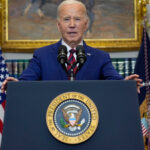
Published December 6, 2022
There’s been a great deal of buzz lately about “Christian nationalism.” Initially largely a term of abuse defined by its critics, the term has increasingly been adopted by a growing tribe of Christian conservatives as a badge of honor. Even among these, however, there are several competing agendas jostling for leadership, some of them representing a recovery of what are just good old-fashioned Protestant political principles, but others serving as a Trojan horse for ugly agendas antithetical to Christian witness.
To understand “Christian nationalism,” though, we must first understand “nationalism,” a word that’s made a comeback lately after decades of unpopularity. For some, it is little more than a synonym for “patriotism,” but for some, it means something more; it means love not merely of a political entity, but of a place, a people, a shared way of life—what Roger Scruton has called oikophilia, or “love of home.” Oikophilia need not lead to xenophobia (fear of the foreigner), but it certainly can do so, and this is where Christians need to be very careful, especially if “my people” and “outsiders” start to be defined in racial categories.
Please continue reading with WORLD Opinions.
Brad Littlejohn, Ph.D., is a Fellow in EPPC’s Evangelicals in Civic Life Program, where his work focuses on helping public leaders understand the intellectual and historical foundations of our current breakdown of public trust, social cohesion, and sound governance. His research investigates shifting understandings of the nature of freedom and authority, and how a more full-orbed conception of freedom, rooted in the Christian tradition, can inform policy that respects both the dignity of the individual and the urgency of the common good. He also serves as President of the Davenant Institute.
Photo by Markus Spiske on Unsplash
Brad Littlejohn, Ph.D., is a Fellow in EPPC’s Evangelicals in Civic Life Program, where his work focuses on helping public leaders understand the intellectual and historical foundations of our current breakdown of public trust, social cohesion, and sound governance. His research investigates shifting understandings of the nature of freedom and authority, and how a more full-orbed conception of freedom, rooted in the Christian tradition, can inform policy that respects both the dignity of the individual and the urgency of the common good. He also serves as President of the Davenant Institute.










